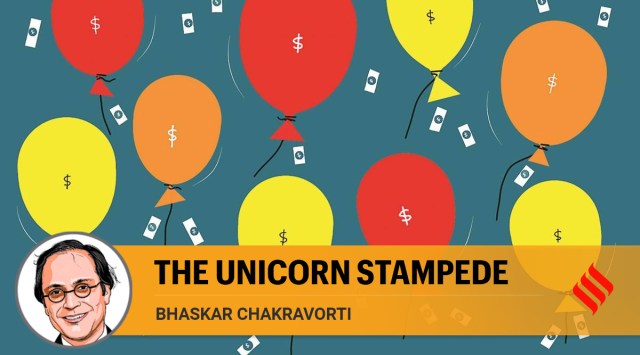- India
- International
Indian tech unicorns are gaining at China’s expense. Is this a blessing or a bubble waiting to burst?
Bhaskar Chakravorti writes: The last thing India can afford is a bubble that bursts and for capital, talent and technology to take flight and seek refuge elsewhere.
 While the emergence of a dynamic digital ecosystem is indeed exciting, there is reason to worry about the speed of this emergence. (Illustration by C R Sasikumar)
While the emergence of a dynamic digital ecosystem is indeed exciting, there is reason to worry about the speed of this emergence. (Illustration by C R Sasikumar)
Tiger Global Management, a New York-based investment firm, has a reputation for tracking and hunting unicorns — startups with billion dollar-plus valuations. This year, if we were to track the Tiger’s shifting gaze, we would catch sight of an interesting migratory phenomenon: Fewer unicorn sightings in China — ordinarily the biggest unicorn habitat outside the US — and the beginnings of a unicorn stampede in India. While the shifting of the Tiger’s gaze cannot be good for China, I worry it may not be good for India either.
But, first, let me step back up and fill in the story. For this, we begin in China, where President Xi Jinping seems hellbent on knee-capping its most dynamic sector. I speak of China’s tech industry that contributed over 38 per cent to the country’s GDP last year, and was key to managing both Covid and the economy. Nevertheless, Beijing has decided to crack down on the industry, wiping out $1.5 trillion in market value. The crackdown began with the abrupt suspension of the much-anticipated initial public offering (IPO) of Ant Group last November, while founder, Jack Ma, the very face of Chinese tech worldwide, mysteriously went underground. To add to the intrigue, pressures on Ant only continued to mount. It wasn’t just the Ant Group in the government’s crosshairs. China’s regulators stopped the ride-hailing company, Didi Chuxing, from accepting new users, as soon as it went public on the New York Stock Exchange. Founders of companies, such as JD.com, TikTok and Pinduoduo seem to have been sufficiently spooked to seek early retirement.
Then there have been sweeping industry-wide changes, from anti-monopoly legislation to new rules governing data collection and use. The state’s shadow extends well beyond restricting capital markets access and tightening regulations. Weekends and holiday tutoring by private tutors are off-limits. Video games, on the other hand, can only be played on Fridays and weekends. Financial bloggers, whose data does not agree with official statistics, are being scrubbed out of existence. Male digital idols considered too effeminate are out of favour, as are certain digital celebrities and influencers.
Needless to say, all of this has investors spooked as well. Of all the major hedge funds, Tiger Global Management topped the list in terms of greatest exposure to the risks created by China’s tech crackdown. As you might expect, Tiger needed to turn elsewhere, which brings us to its gaze turning towards India. While not new to the Indian market, Tiger’s interest in India has spiked, and, of course, this has not escaped the attention of other investors. China may have four times the number of unicorns as India, but this year India has far outstripped China in newly minted unicorns; thanks to Tiger and those following its lead, for the first time since 2013, the value of venture deals in India surpassed that of China. Tiger’s investment in Innovaceer, for example, has given India its first health-tech unicorn.
If this keeps up, India will experience a veritable blessing of unicorns — yes, “blessing” is the actual term for a herd of these mythical creatures — thanks not only to the fact that the money fleeing China needs refuge, but to many converging forces within India itself. India is the world’s second largest digital market. The use of the United Payment Interface has made digital payments easier in a society that was — and still is — so tied to cash. The pandemic lockdowns have driven an unusually large proportion of that digital population to spend an unusually large amount of time and spend money online. This means that in a very short time, the need to serve this digital population has exploded. The Chinese crackdown could not have come at a more opportune time. Many startups are in a hurry to capitalise on the boom with many investors looking to capitalise them: Meesho will help you sell stuff on messaging apps; Razorpay can help with online payments; Chargebee can manage online subscriptions; ShareChat can get you into Tier 2 and Tier 3 cities over a vernacular social media platform.

While the emergence of a dynamic digital ecosystem is indeed exciting, there is reason to worry about the speed of this emergence. When investors rush in to seek refuge because they are fleeing risk elsewhere, even if the refuge looks promising, they can contribute to a self-reinforcing cycle that ends up destroying the refuge. The early investors draw in others who fear they are missing out, and more investors rush in, perpetuating the cycle. The cascading tranches of money over-capitalise startups by giving more money than what’s needed to get to necessary milestones. Eager to get a piece of the action, each investor may over-value a company, far exceeding what is justifiable based on market fundamentals. The stampede builds and soon you have the makings of a tech bubble.
Instead of reflexively chasing the next shiny startup in India, investors ought to ask a few questions: Do the startups and the markets they serve have the capacity to scale up and do they justify sticking with them for a long period? Can these startups, eager to win customers with rock-bottom pricing, ever discover a path to profits, especially with Indian consumers used to bargains? What are the most plausible exit pathways for investors? Has the Indian initial public offerings market really proven itself? Does the experience of just one Zomato post-IPO tell us enough about the future of India’s IPO potential? Are there enough large corporations that might buy these startups? Could the high initial valuations deter follow-up funding by future investors and acquirers? Have the risks of numerous regulatory uncertainties of India been adequately addressed? Will the still-rickety infrastructure, the poor track record of managing either Covid or the economy become obstacles for the startups, no matter how essential their services seem today? Can the under-investment in essentials, such as education, health and job market readiness, clog the talent pipeline? What happens to Indian digital habits in a post-Covid world, whenever that comes about? In a country that thrives on human contact, would people eventually take their eyes away from their screens and go back to the crowded shops, streets and buildings that are the very essence of India? Can the Indian government be trusted not to borrow a page from the government it would like to emulate — the Chinese state — and attempt a crackdown of its own?
Don’t get me wrong: It is exciting to see this huge interest in India’s tech startups — even if it is at the expense of another country. But it would be wise for investors to take a deep breath and ask a few questions. India desperately needs patient capital, skilled talent and appropriate technology to solve the country’s numerous fundamental problems laid bare by the pandemic. The last thing India can afford is a bubble that bursts and for all three to take flight and seek refuge in yet another country because no one — not even Tiger — wants to pick up the pieces of a popped bubble. Let’s make sure that the blessing of unicorns does not end up saddling India with a curse.
This column first appeared in the print edition on September 24, 2021 under the title ‘The unicorn stampede’. The writer is dean of Global Business at The Fletcher School at Tufts University, the founding executive director of Fletcher’s Institute for Business in the Global Context and a non-resident senior fellow at the Centre for Social and Economic Progress.
EXPRESS OPINION
More Explained
Apr 27: Latest News
- 01
- 02
- 03
- 04
- 05












































